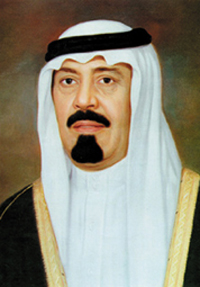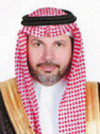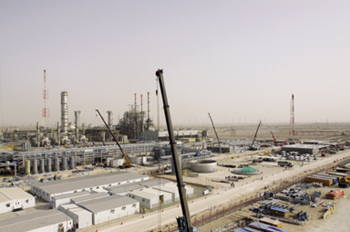¡®Extending Bilateral Investments May Lead to Enhanced Economic Ties
The following is a congratulatory Message by Amb.. Ahmad Y. Al Barrak of the Kingdom of Saudi Arabia on the anniversary of the National Day of the kingdom., which falls on Sept. 23 ¡ª Ed.
 The celebration of the National Day of the Kingdom of Saudi Arabia for this year comes while the renaissance march- that has been initiated by the founder, His Majesty King Abdul Aziz Al-Saud, May God bless him, who laid the foundations of the Kingdom¡¯s ideological, institutional and administrative pillars- still continuing in the era of His loyal sons, guided by His ideas and rich experiences in the fields of development planning and economic administration, resulted in concrete achievements and successes in all fields, that have been reflected in continuing rise in citizen¡¯s standard of living and their quality of life, comprehensive urban and industrial renaissance, infrastructure system, advanced economic and social services that covered all parts of the Kingdom. Such achievements stand as a clear evidence of the effectiveness of development approach that has been adopted by the Kingdom of Saudi Arabia.
The celebration of the National Day of the Kingdom of Saudi Arabia for this year comes while the renaissance march- that has been initiated by the founder, His Majesty King Abdul Aziz Al-Saud, May God bless him, who laid the foundations of the Kingdom¡¯s ideological, institutional and administrative pillars- still continuing in the era of His loyal sons, guided by His ideas and rich experiences in the fields of development planning and economic administration, resulted in concrete achievements and successes in all fields, that have been reflected in continuing rise in citizen¡¯s standard of living and their quality of life, comprehensive urban and industrial renaissance, infrastructure system, advanced economic and social services that covered all parts of the Kingdom. Such achievements stand as a clear evidence of the effectiveness of development approach that has been adopted by the Kingdom of Saudi Arabia.
Over more than three decades, structural developments have been achieved, including economic and social aspects that are visible on both macro and sectoral levels. The Kingdom¡¯s economy gained a lot of power elements which enabled it to face the global economy¡¯s volatility, and increased its adaptability to sudden changes and developments. Over the past years, the Kingdom of Saudi Arabia has witnessed remarkable increase in the volume of direct foreign investments and became the leading country in the Middle East in this field. The Kingdom was ranked the 16th among 181 countries in 2008 for attracting FDI according to the IFC of the World Bank Group.
Given that Saudi citizen is the center of development and its ultimate goal, human resources development received particular importance in the renaissance march of the Kingdom, sectors of education and training have achieved high levels and unprecedented growth
Thanks to God and thanks to such economic and social progress, the Kingdom has assumed a prominent place among the countries of the world, and an active member in the international community. The Kingdom of Saudi Arabia is among top donor countries to provide a helping hand to all those who are in need. The total value of aid and concessional developmental assistances to the developing countries provided by the Kingdom through bilateral and multilateral channels reached more than $ 90 billion during the period from 1973 to 2007, benefiting 87 countries worldwide, namely in Africa and Asia. The Kingdom¡¯s donations exceeded the percentage set by the U.N. for donor countries which is 7.0% of GDP.
The Kingdom¡¯s efforts to support development plans in the developing countries are not only confined to provide assistances, but also worked for employing its contributions in many regional and international development institutions in order to support international initiatives and efforts to solve development problems that face these countries.
In the context of efforts to strengthen bilateral relations, the two countries witnessed a remarkable progress as a result of the Summit between the Custodian of the Two Holy Mosques King Abdullah Bin Abdul Aziz Al-Saud, King of the Kingdom of Saudi Arabia, and the late former president His Excellency Roh Moo-hyun, in Riyadh during 24-26 March, 2007, and the talks that was held between the late Korean President and His Royal Highness Crown Prince Sultan bin Abdul Aziz Al-Saud. Such developments were indicators that bilateral relations have entered a new phase of promotion and development. Seven Memorandum of Understandings were signed during President Roh¡¯s visit to the Kingdom.
The Republic of Korea is one of important countries for the Kingdom in terms of its economic international relations order. As being a developing country with a useful and impressive development experience, as well as its international influence as a G20 member, and as one of important international trade partner with the Kingdom, Korea has acquired a unique experience in facing international economic crises.
Extending bilateral investments may lead to the strengthened political and economical ties, and thus achieve economic growth for both sides. Trade relations between Saudi Arabia and the Republic of Korea have witnessed a steady development during the last five years which is reflected by increasing of trade volume reached 300% during that period. The number of joint ventures reached around 98 projects, including industrial ones.
Lastly, I pray for Almighty God to grant success to the leader of the renaissance march, the Custodian of the Two Holy Mosques Abdullah Bin Abdul Aziz Al-Saud, King of the Kingdom of Saudi Arabia, and His Royal Highness Crown Prince Sultan bin Abdul Aziz Al-Saud, may God protect them, for their tireless efforts to promote the Kingdom to the highest position and to make the Kingdom¡¯s people more happier. I may also pray for God every success in carrying out my missions and enhancing the distinguished between the Kingdom of Saudi Arabia and the friendly Republic of Korea. nw
Saudi Arabia Guarantees Success for Foreign Investors
In today¡¯s global economic slowdown, businesses have tendencies to look at three things: cost cutting, cash management, and sales increases. I have a firm conviction that Saudi Arabia can help address these objectives as it continues to strive its way toward becoming one of the best investment destinations around the world.
VISION, MISSION AND INVESTMENT PROPOSITIONS -The Kingdom is transforming itself into one of the world¡¯s top 10 most competitive economies, and therefore, one of the most lucrative markets for strategic investment, by investing massively to enhance its value proposition to foreign businesses, both with infrastructure and with reform. In 2004, His Majesty King Abdullah bin AbdulAziz Al Saud, Custodian of the Two Holy Mosques, has directed the Saudi government to become one of the world¡¯s Top 10 most competitive economies by 2010 ¡ª the 10x10 mission. Its vision is to achieve rapid and sustainable economic growth in Saudi Arabia, capitalizing on the Kingdom¡¯s competitive strength as the global capital of energy and as a major hub between East and West. In pursuit of this goal, the organs of government have initiated a multi-faceted reform strategy that has made the Kingdom one of the easiest places in the world to do business. The design of the strategic plan focused around two core competencies: energy and location. To complement these competencies, Saudi Arabia has been focused on creating both a pro-business and knowledge based society as well as developing world-class economic cities.
ROAD TO 10X10: THREE MAJOR INITIATIVES ¡ª In order to achieve these objectives, three initiatives were created. The first initiative to enhance creating pro-business environment involves institutionalizing the competitiveness management process through process reengineering.
Secondly, Saudi Arabia is investing tens of billions of dollars into the launch of four world-class economic cities: public-private partnerships that will create tomorrow¡¯s most attractive investment platforms for foreign companies. These unprecedented developments combine world-class infrastructure, cutting-edge design principles, and special incentives and streamlined processes to create foreign investment-led hubs in knowledge-based industries and other crucial sectors. This investment project is expected to add over $150 billion USD to the Saudi GDP, generate 1.5 million jobs, and provide ultimate living destinations to over 4.5 million people. These economic cities include King Abdullah Economic Cities(KAEC) in Rabigh, Prince AbdulAziz Bin Musaed Economic City in Hail, Knowledge Economic City in Madina, and Jizan Economic City(JEZ) in Jizan.
Thirdly, the initiative also included efforts to become the most globally competitive nation in three sectors: energy, transportation and knowledge based industries (KBI). Saudi Arabia is the source to a quarter of world¡¯s oil supply, and it is no surprise that Saudi Arabia offers the world¡¯s most competitive energy prices to investment projects. Saudi Arabia has the plan to become the energy capital of the world, investing over $ 300 billion USD in the energy related industries including petrochmicals, downstream to petrochemical, minerals and power & water. Moreover, Saudi Arabia plans to attract more than 100 billion USD in logistics, roads, airports, ports and other facilities to transform Saudi Arabia to world¡¯s major transportation base. This initiative also targeted growth and development in the knowledge based industries, such as areas of healthcare, information communication technology, education and life sciences.
WORLD¡¯S COMPETITIVENESS ¡ª As the world¡¯s fastest-reforming economy, Saudi Arabia has seen growing momentum and recognition for its economic transformation. Under Saudi government¡¯s strong commitment and drive toward creating better investment climate for foreign firms and foreigners, Saudi Arabia has risen from 67th to 23rd position out of 181 countries in the World Bank¡¯s Ease of Doing Business Index just in three years from 2005 to 2008, and is currently number one in the Middle East, ahead of Bahrain, the UAE and Kuwait. The Kingdom ranks 3rd and 7th in the world, respectively, for ease of registering property and paying taxes. Moreover, firms in Saudi Arabia thrive in this pro-business environment. Saudi firms occupied the top three spots in Forbes assessment of 1,616 joint-stock companies in the Arab world in late 2006. The Kingdom¡¯s financial institutions are the largest in the region, and compete comfortably with the world¡¯s best.
STABLE DOMESTIC ECONOMY ¡ª Saudi Arabia¡¯s economy provides unparalleled security to investors. The Saudi Riyal is one of the most stable currencies in the world. Sound macroeconomic management has allowed the Kingdom to maintain a fixed exchange rate without any restrictions on foreign exchange and outgoing money transfers. Inflation rates in Saudi Arabia are very low and the Kingdom is signing bilateral agreements with an increasing number of countries to encourage investor protection and reduce tax burdens. Ample capital availability, low taxes, and stable prices have earned Saudi Arabia the world¡¯s top ranking for the quality of its macroeconomic environment.2
In addition to the Kingdom¡¯s strong economic climate for investment, one of the country¡¯s strongest advantages and incentives for foreign investment, however, is its people. The majority of Saudi Arabia population is young, with 57% of the country under 25 years of age. Recognizing this as the country¡¯s greatest potential asset, the Government is investing billions of dollars in education in order to train the next generation¡¯s highly skilled workforce. As the world¡¯s 8th highest spender on education, Saudi Arabia will provide investors with more opportunities to select the highest quality labor for their projects.
What does all this mean? Higher productivity and profitability, and above all: boundless potential in the world¡¯s fastest reforming business climate. Few obstacles remain for both local and foreign investors in Saudi Arabia. I look forward to welcoming all Korean companies to take part in our growth, to take advantage of the wide range of investment opportunities in the Kingdom. nw
King Abdullah Bin Abdul Aziz Al-Saud of the Kingdom of Saudi Arabia
Amb. Ahmad Y. Al Barrak of the Kingdom of Saudi Arabia
A view of AAC Chemical plant being built by Hanwha E&C in the Jubail Industrial Complex in Saudi Arabia due to be completed this year.
3Fl, 292-47, Shindang 6-dong, Chung-gu, Seoul, Korea 100-456
Tel : 82-2-2235-6114 / Fax : 82-2-2235-0799